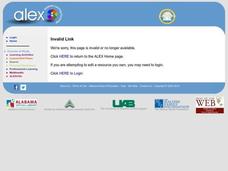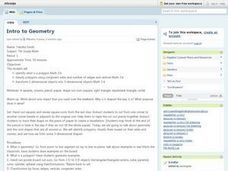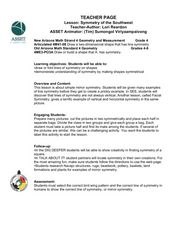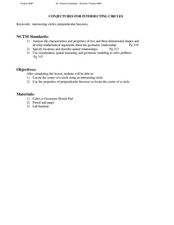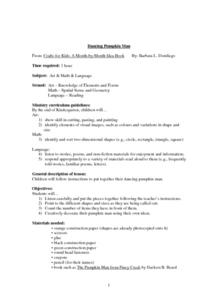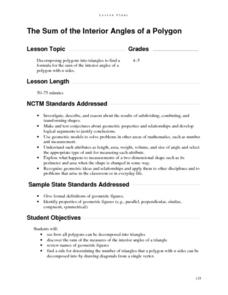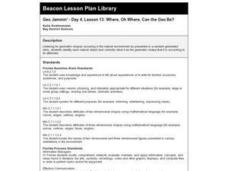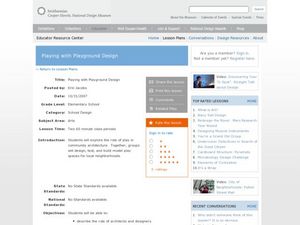Curated OER
Geo-Town
Second graders use a checklist to construct a Geo-Town map including a compass rose, a map key, and a paragraph about a walk around Geo-Town, using appropriate geometric and directional vocabulary to identify the two-dimensional figures...
Curated OER
Geometric Figures
Students identify two and three dimensional shapes and use appropriate geometric vocabulary to write a description of the figure by taking pictures of geometric figures in their own environment.
Curated OER
Chopping Cubes
Middle schoolers work in small groups to make various geometric solids with Play-Doh. They use fishing line to make cuts and observe the shapes of the cross-sections. Pupils complete an assessment in which they answer questions such as:...
Alabama Learning Exchange
Understanding Fractions
Young learners explore fractions and demonstrate parts of a whole by using a candy bar and a piece of paper and dividing both into equal parts. Included is a worksheet that requires youngsters to color in half of each polygon shape. Some...
Curated OER
Quilting
Learners use a monochromatic palate, select shades and tints for a selected hue, or select complimentary or analogous colors for a quilt design. They design quilt squares using basic geometric shapes, repetition, balance, and proportion.
Biology Junction
Biochemistry of Cells
Chemistry and biology work hand in hand, without one you literally wouldn't have the other. Using a presentation, individuals learn about plant cells, animal cells, cell responses, macromolecules, DNA bases, and so much more. A worksheet...
Curated OER
Problems!!!
In this word problems worksheet, students read word problems about one person telling the truth and one telling a lie and they figure out which is which. Students complete 4 problems.
National Gallery of Canada
Taken Out of Perspective
Art does not always have to look perfectly realistic. Play with proportion and shape by stretching images. Pupils study works of art by Picasso, Cézanne, and Monet before selecting a photograph to adapt. They use a distorted grid to...
Curated OER
Intro to Geometry
Seventh graders identify a polygon and classify them using congruent sides and number of edges and vertices. Students transform two dimensional objects into three dimensional objects.
Curated OER
Symmetry of the Southwest
Fourth graders examine mirror symmetry. In this symmetry lesson, 4th graders discover that symmetry is not always vertical or horizontal. Students cut and fold shapes along lines of symmetry.
Curated OER
SAMMY DISCOVERS SHAPES AT SCHOOL
Students study maps and use them for real world experiences.
Curated OER
Investigating Nets and Polyhedra
Fifth graders create a net for a given polyhedron. They determine the corresponding polyhedron for a given net. Students investigate several polyhedra (cube, tetrahedron, and one of their choosing) and their corresponding nets. They...
Curated OER
More Prisms/Nets
Students calculate the volume and surface are of three-dimensional shapes. In this geometry lesson, students use the nets to prove their calculations of shapes. They identify the different parts of a solid using the nets.
Curated OER
Faces, Vertices, Edges
Students identify the parts of three dimensional objects. In this geometry instructional activity, students find the number of faces, edges and vertices. They differentiate between prisms and polyhedra.
Curated OER
Conjectures of Intersecting Circles
Young scholars make conjectures of intersecting circles. In this geometry lesson, students observe circles and their position in space. They investigate and observe two and three dimensional objects.
Curated OER
Diagonals to Quadrilaterals II
Pupils identify the properties of different polygons. In this geometry lesson, students find the slope of a line and calculate the distance between two lines. They differentiate between similar and congruent polygons.
Curated OER
Conjectures For Intersecting Circles
Students identify properties of circles. For this geometry lesson, students identify the center of two intersecting circles.They use Cabri software to create circles and move it around to make observation.
Curated OER
Dancing Pumpkin Man
Students listen carefully and put pieces together following the teacher's instructions. They point to the different shapes and sizes as they are being called out and count the number of items they have in front of them. They decorate...
Improving Measurement and Geometry in Elementary Schools
The Sum of the Interior Angles of a Polygon
Junior geometers discover that polygons can be decomposed into triangles and that the number of triangles can be determined by a rule. Note that the Geometer’s Sketchpad® software is required to carry out all components of this...
Curated OER
Geo Jammin' - Day 4, Lesson 13: Where, Oh Where, Can the Geo Be?
Learners listen to a story "My Crazy Dream" with an intent to identify shapes in ordinary objects. They raise their hands when they've heard an object whose shape they can identify. They discuss their findings.
Curated OER
Perfumania
Students identify various geometric shapes. Apply the given formulas to determine the volume of these shapes. Design their own container to conform to specifications provided. Use their knowledge of volume formulas and shapes to compute...
Curated OER
Playground Design
Students design recreational equipment for a community. In this architecture lesson, students work in pairs to design the equipment. Students select materials and begin designing. Students assess themselves with a pre-made rubric.
Curated OER
Classifying Polygons
Seventh graders participate in a polygon hunt. In this polygon lesson, 7th graders examine how polygons are alike and different. Students create a Venn diagram and label the sorting circles. Students work in cooperative...
Curated OER
Patterns Here, There, and Everywhere!
Upper graders access the Microsoft Word program and create patterns by utilizing certain keys on the keyboard. They create picket fences, smiley faces, and hearts. It seems that this lesson has as much to do with keyboarding skills as it...



